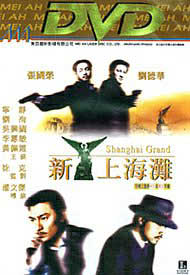Shanghai Grand

Reviewed by YTSL
I had high hopes for this 1996 Film Workshop adaptation
of a popular early 1980s TV series that starred Chow Yun-Fat and Ray Lui
in the roles played here by Leslie Cheung and Andy Lau. For one thing,
it is a favorite of a Hong Kong movie friend and Brian also had good things
to say about it. For another, Leslie Cheung is known for being more
astute than many other Hong Kong performers -- including his way more prolific
co-star -- with regards to his choice of which work he is willing to be a
part. Then there was the promise that came from this offering having
a 1930s Shanghai setting and its producer, Tsui Hark, seeming to be able
to do more substantive things with period pieces than (more) temporally contemporary
works.

SHANGHAI GRAND gets off on a promisingly powerful note with an opening scene
that takes place on a boat being buffeted by high waves and stormy weather.
The film's audience gets thrown straight into an intense situation which
involves the torture of a couple of betrayed members of "the Taiwan People's
League" (in a bid to discover which of them is a man named Hui Man Keung),
the cold-blooded machine-gunning of all but one of the captives plus a gun
battle between the one escapee and the archvillainess along with her henchmen
(while an individual later revealed to be the chief traitor of the patriotic
Taiwanese Chinese cause looks on). It also is via these circumstances
and on this vessel that we get introduced to three people who will play key
parts in the rest of this action drama's proceedings.

Leslie Cheung -- silly little moustache, stubble and all -- is mesmerizing
as the smoldering Hui Man Keung (and IMHO, it is really only when he is on
screen that this often wonderfully atmospheric yet at times surprisingly
hollow feeling work has a heart). Almen Wong spices up things with
her portrayal of the formidable female Japanese collaborator who unfortunately
does not have that large a part in SHANGHAI GRAND. To keep the elements
of surprise that ought to remain in certain salient plot twists that occur
later in this multi-stranded movie, I think it best to not reveal who plays
the third of this trio of characters. However, the reader -- and (potential)
viewer of this film -- would do well to note that Hui's chief visual memory
of one of his hated enemies is that this individual is a smoker of cigars.
Similarly, a cheongsam's pattern is what the revenge-seeking Hui utilizes
to identify the sadistic woman responsible for the death of his comrades.


The hokey manner in which Hui and Ding's paths cross and lives get intertwined
is something else that occurs in a manner that does not help the cause of
SHANGHAI GRAND. At the same time, and worse, there is a predictability
to the film that comes from one's knowing that it really is only a complete
piece of fiction. Consequently, some way before its end, it ceases
to be the effective affecting work that its makers seemed to have sought
for it to be. Perhaps it's no coincidence then that its director (cum
co-scriptwriter), Poon Man Kit, does not appear to have been given a production
to helm in the five years or so since this disappointingly flawed movie --
which nevertheless has a choice scene involving a boa constrictor! -- was
first released in Hong Kong cinemas.

My rating for this film: 6.






